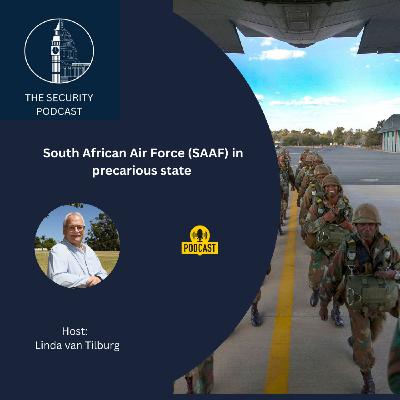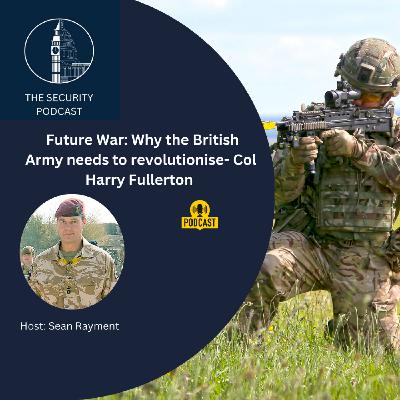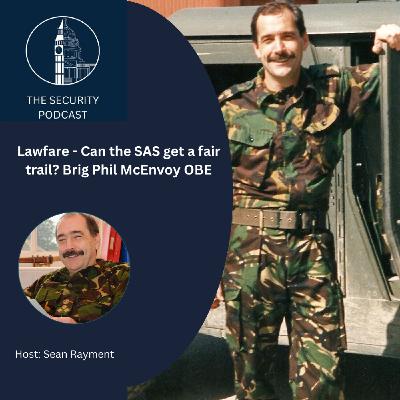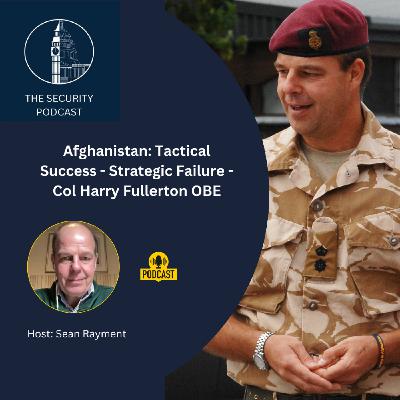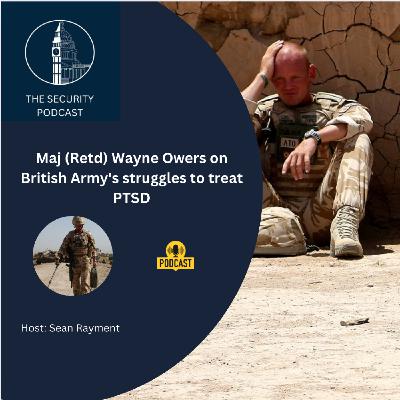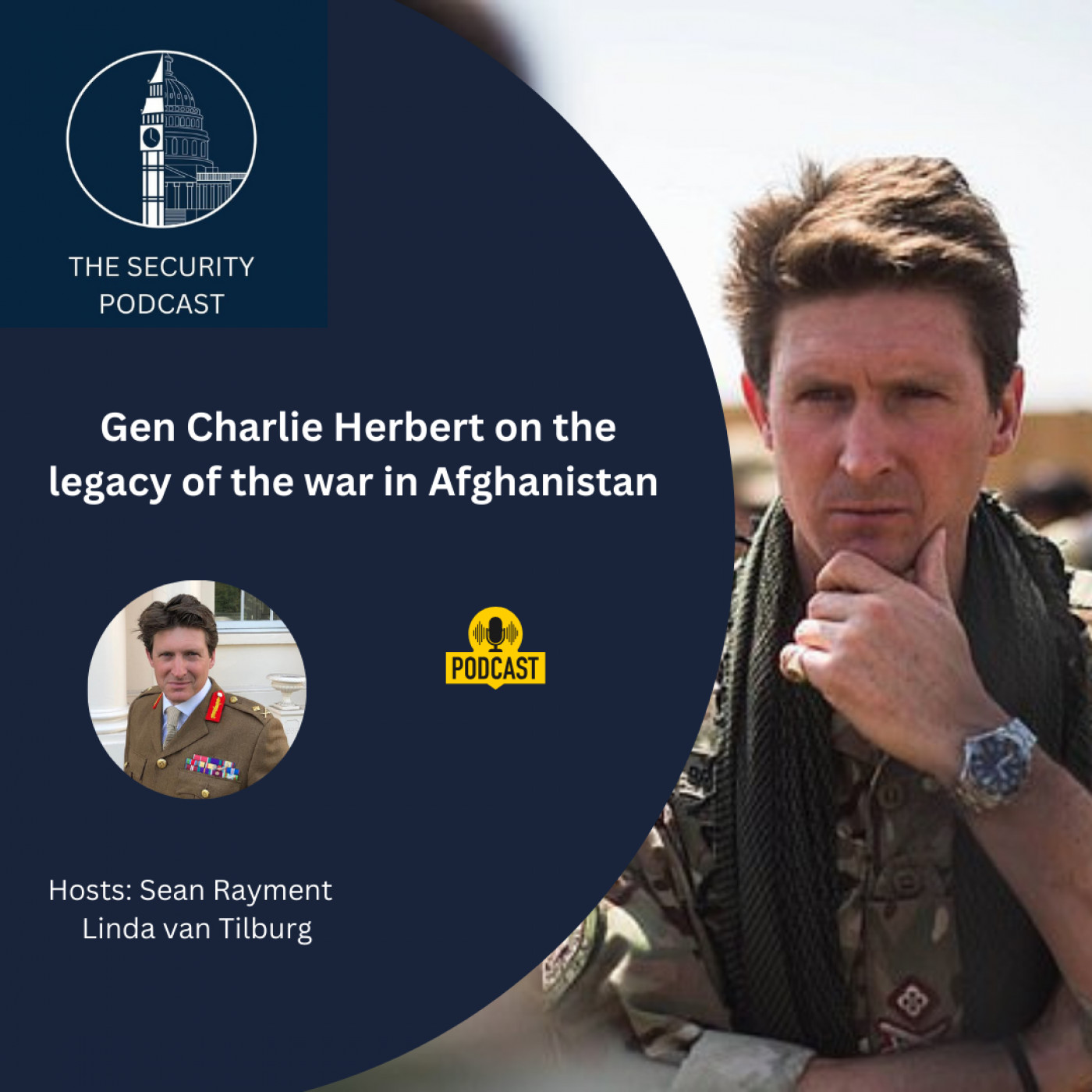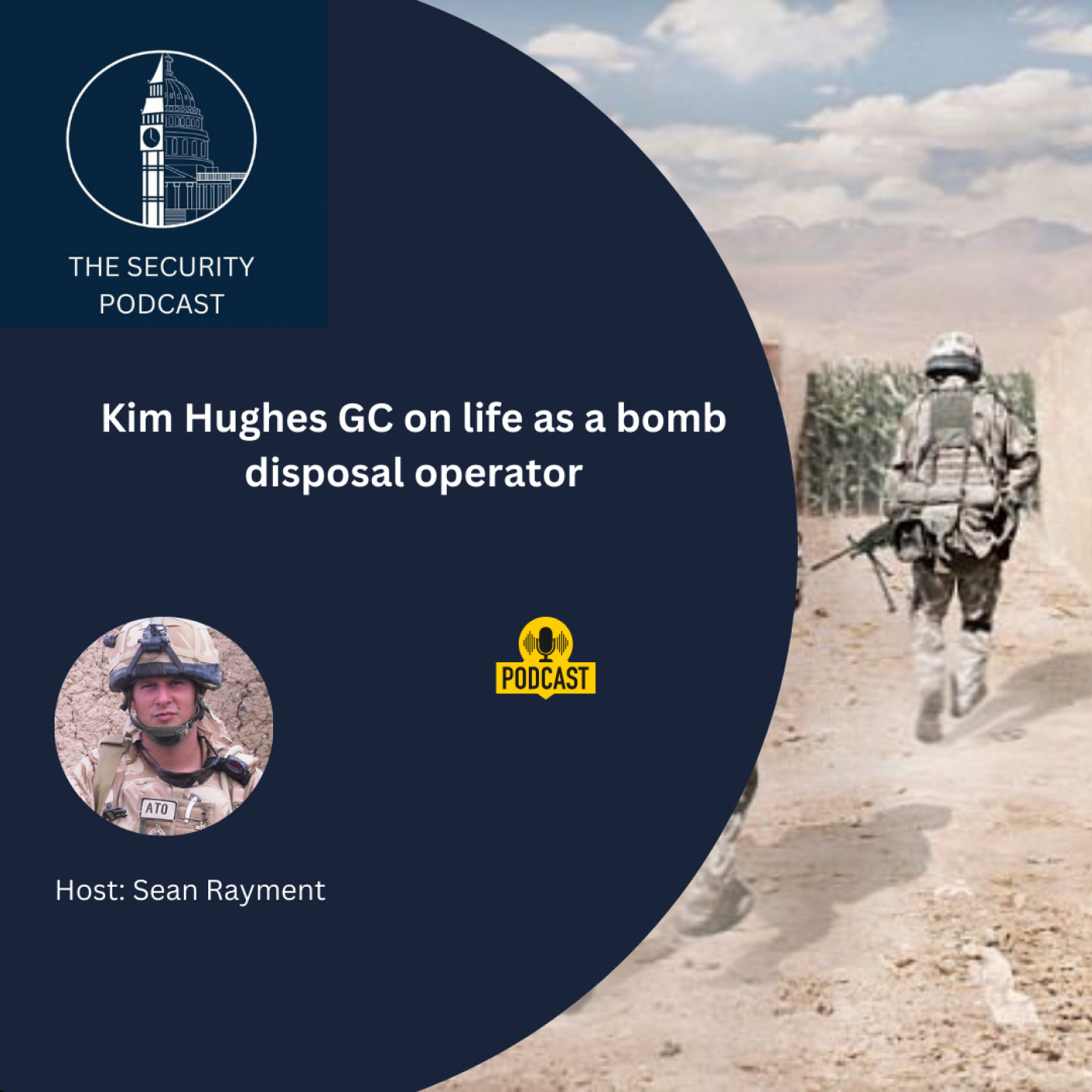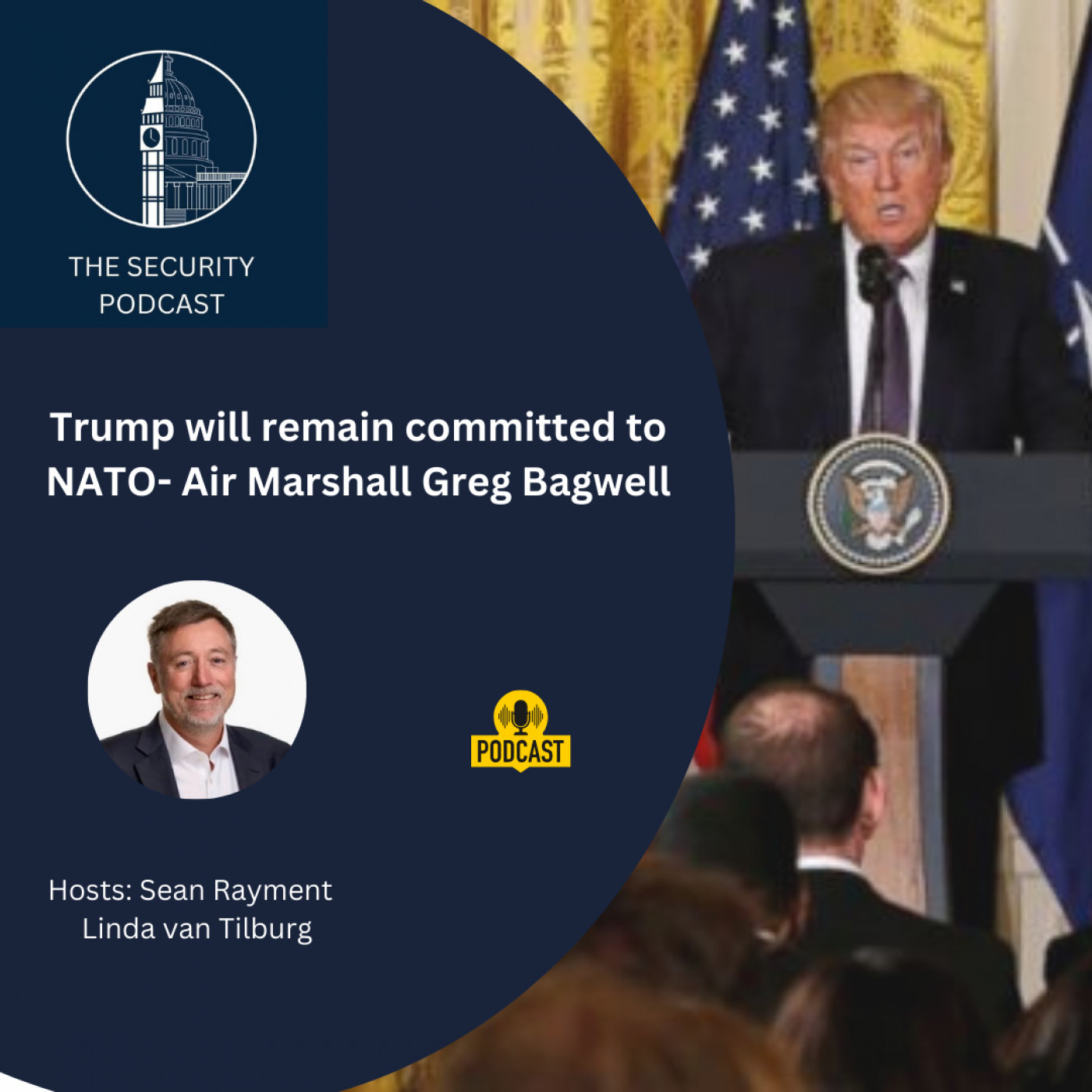Discover The Security Podcast
The Security Podcast
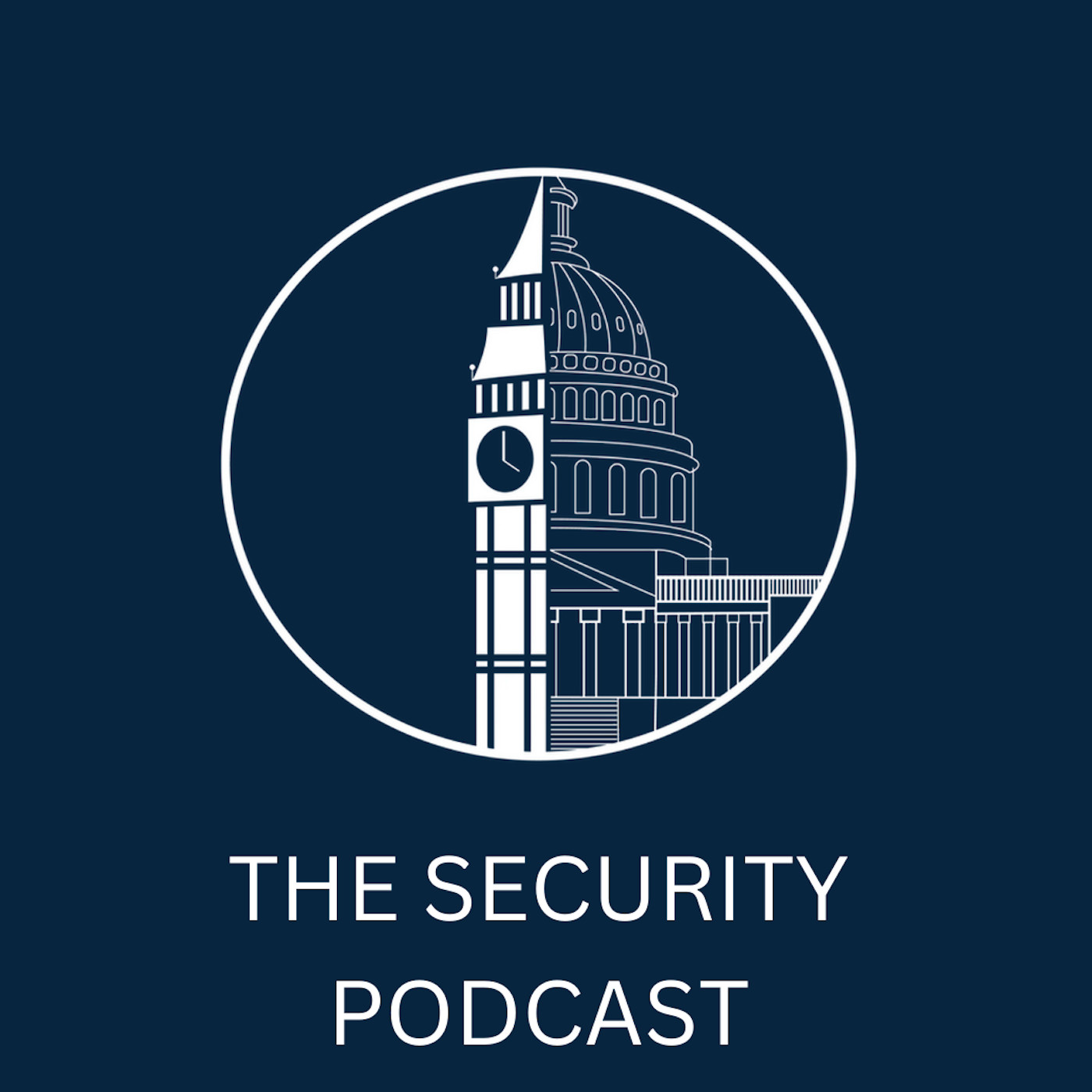
The Security Podcast
Author: National Security News
Subscribed: 4Played: 15Subscribe
Share
© National Security News
Description
Welcome to The Security Podcast where journalists Sean Rayment and Linda van Tilburg from National Security News along with their guests, will deliver their take on the global national security issues which affect us all.
At National Security News (NSN), our mission is to provide timely, accurate, and comprehensive coverage of national security matters from around the world. We understand the critical importance of staying informed in an ever-changing global landscape, where security challenges are constantly evolving.
https://nationalsecuritynews.com/
At National Security News (NSN), our mission is to provide timely, accurate, and comprehensive coverage of national security matters from around the world. We understand the critical importance of staying informed in an ever-changing global landscape, where security challenges are constantly evolving.
https://nationalsecuritynews.com/
19 Episodes
Reverse
In this episode of The Security Podcast we examine the critical state of South Africa’s Air Force. It has been reported as reaching a critical low with only six fully operational and defence ready aircraft out of a fleet of 330. It is the latest revelation in a litany of failures for the country’s defence force and has raised serious concerns about the country’s ability to defend itself, protect its 3,000 km coastline, manage its land borders, and provide regional stability. Our guest is Kobus Marais, a defence analyst and the former opposition party Shadow Minister of Defence, who says that rebels groups like the M23 in the Democratic Republic have better equipment than the South African National Defence Force.
Transforming the British Army into a war winning machine will require a revolution not an evolution, according to Colonel (Retd) Harry Fullerton OBE.
The British Army's fighting Power has been allowed to erode over the past 35 years. The publication Government’s Strategic Defence Review 2025 (SDR 25) has been delayed, pending the production of a new National Security Strategy. In light of the delay, there is an opportunity to examine what the ideal Land Force of tomorrow should look like.
In this episode of the Security Podcast with Col Fullerton, former commanding officer of the Household Cavalry Regiment looks at what the Army needs to do to transform itself into a lethal, competent fighting force capable of meeting the challenges of a future conflict.
Lawfare - what it means for serving and former members of the British Armed forces - especially those serving in the SAS/SBS is the subject of the latest episode of The Security Podcast. Our guest is Brig (Retd) Phil McEvoy, the former head of Operational Law Army and the Deputy Head of the Service Prosecuting Authority. Recently, the coroner who presided over the inquest into the 1992 Clonoe Ambush, which resulted in the deaths of four IRA terrorists being shot dead by the SAS, submitted his findings of unjustified killings of the terrorist to the Director of Public Prosecutions. This effectively means that the four SAS veterans could face criminal charges. So, are these inquests into legacy killings an SAS witch-hunt or the correct application of the law? This, and other aspects of lawfare, are discussed in this episode of the Security Podcast.
In the second part of the podcast with Colonel Harry Fullerton, the former commander of the Household Cavalry regiment assesses what went wrong in Afghanistan and why. Harry explains that while he, and other commanders, achieved tactical success on the ground - defeating the Taliban wherever they met them - the overall mission was a strategic failure. He describes the campaign as Britain’s fourth Afghan War, adding that the previous three had all failed. He lists the many failings associated with the campaign but argues that the greatest mistake was the misguided belief that Western nations could deliver democracy to a country like Afghanistan in such a short period of time
Harry also talks about the loneliness of command, the fear of failure and the differences between commanding troops on combat operations compared to undertaking public duties back in the UK.
Africa has witnessed a significant surge in the recruitment of child soldiers across conflict zones, exacerbated by Islamic insurgencies advancing southward across the continent. The United Nations has highlighted a notably high increase in child recruitment, primarily by non-state armed groups, estimating that 8,655 children were recruited for conflicts in 2023. Disturbingly, children as young as five, were coerced into joining.
In an interview with The Security Podcast , Naomi Haupt, a researcher from the University of the Free State in South Africa, highlighted how the recruitment of child soldiers is driven by factors such as armed conflicts, political instability, poverty, weak governance, and ethnic tensions. Armed groups exploit children's vulnerability, sometimes forcing them into service, she said. Haupt recommends withholding aid to countries where the recruitment of children takes place to strengthen accountability.
Why is the British Army failing and what can be done about it ? In this episode of The Security Podcast, Colonel Harry Fullerton discusses the sequence of events which has led to the British Army become a force of just 72,000 soldiers and limited combat power at a time when geo-political uncertainty is at its highest level since the end of the Second Word War.In the podcast, Harry explains why the Army needs to undergo transformation change. And why the UK’s defence chiefs should embrace a culture of constructive criticism from within.
In the latest episode of The Security Podcast, Maj (Retd) Wayne Owers MBE, QGM, a former Army bomb disposal officer, explains how his Army career came to a shuddering halt after he was diagnosed with PTSD. Rather than getting help, Wayne, who had served for 27-years, was booted out of the Army. During his career, Wayne completed two tours of duty in Afghanistan firstly as a bomb disposal officers for which he was awarded the Queen's Gallantry Medal. In a second tour as a Weapons Intelligence Specialist, he received an MBE. In the podcast, Wayne talks about coping with losing colleagues, PTSD and why the Army still doesn't know how to properly treat troops with combat-related mental health issues.
In the latest episode of The Security Podcast, Guardian Journalist and best selling author Luke Harding reflects on his four year stint as the newspaper's bureau chief in Moscow. Almost from the moment Luke arrived in 2007 he was targeted by Russian secret police. His apartment was burgled, his emails were hacked, he was followed almost every day and his family were threatened. A hidden camera was even placed inside his bedroom by FSB operatives. The reason for the intimidation was because from the beginning of his four year Moscow assignment Luke wrote articles critical of the Putin regime. He was eventually expelled from the country on Putin's orders in 2011.
Luke now reports on Ukraine where he has been based since before the start of the Russian invasion in February 2022. During the podcast he describes how young Ukrainians were eager to fight on the front line in the early days of the war. Now, however, that enthusiasm has waned as, Luke explains, everyone now knows someone who has been killed or seriously wounded. He also describes how "brainwashed" Russian troops obediently followed orders and tortured and executed hundreds of civilians in Bucha and Mariupole. He also explains why the Ukrainians now want peace and why Russia is unlikely to change even with the death of Putin.
Western intervention in foreign conflicts has produced a mixed legacy—marked by both successes and failures. While efforts in Kosovo halted atrocities committed by Bosnian Serbs, interventions in Libya and Afghanistan were less successful. Nowhere is this clearer than in Afghanistan, where the chaotic withdrawal of NATO forces paved the way for the Taliban's return to power, silencing the voices of women.
As we enter a new year and anticipate President Donald Trump's return to the White House—known for his stance against prolonged foreign wars—The Security Podcast reflects on the legacy of Afghanistan. Major General Charlie Herbert shares his thoughts on Afghan refugees, the loss of British soldiers, and the impact on families that have been shattered, as well as those who have been left maimed and injured. He raises the important question: Was it worth it? General Herbert also expresses concern for Afghan women who were given hope only to have it taken away.
In this episode of The Security Podcast, Kim Hughes reflects on his journey to becoming the UK’s most decorated bomb disposal expert. Renowned for his extraordinary bravery, which earned him the George Cross, Hughes successfully defused over 120 improvised explosive devices (IEDs) in Afghanistan.
He shares how he developed his expertise, recounting the harrowing operations that defined his career, including the day he was awarded the George Cross. Hughes delves into the complex emotions tied to such life-and-death missions and the challenges soldiers face when shifting from life-threatening conditions to the mundane tasks of home life.
Since leaving the army, Hughes has continued his work in global counter-IED efforts, focusing on training and consultancy in various regions, including Africa. He also sheds light on the evolving nature of modern battlefields, from the rise of drones in Ukraine to the monumental task of clearing the IEDs left behind by Russian forces after the war.
In this episode of the Security Podcast, Jerome Starkey, the Sun’s Defence Editor, shares his insights from the frontlines in Ukraine. As a seasoned war correspondent, Jerome has reported from conflict zones worldwide, including Kabul during the Taliban’s takeover, and is now covering the intense Russian offensive in Ukraine. He discusses the evolving mood among Ukrainians, noting a shift from initial resilience to weariness and exhaustion. He highlights a Ukrainian woman’s resentment towards men who do not fight and the women who love them. Starkey also warns of the broader implications if Russia emerges victorious, suggesting that leaders like Putin could be emboldened, with significant global consequences. He highlights the importance of January when Donald Trump is inaugurated, as there will be keen interest in whether he fulfils his promise to end the war within 24 hours and how he will see the US’s role in NATO.
The war in Gaza has polarised communities around the World leaving little room for progressive debate. Major General Charlie Herbert, a former senior Army officer and a veteran of multiple campaigns in Afghanistan, provides his views on the conduct of the war, whether Gaza has a future and the prospects for peace.
President-elect Donald Trump has claimed he would end the war in Ukraine "within days" of taking office, and President Volodymyr Zelensky has indicated that Trump's leadership could indeed expedite the end of the conflict. However, questions remain: What would Trump's peace plan for Ukraine involve? Would Ukraine need to cede territory, and how would a Trump presidency affect NATO and Ukraine’s aspirations of joining the bloc?
This week on The Security Podcast, National Security News Editor, Sean Rayment and Deputy-Editor Linda van Tilburg were joined by Admiral Mike Hewitt, a U.S. Navy veteran who served for 31 years. Admiral Hewitt, also the co-founder and CEO of IP3, an international energy and security company, has extensive experience in Ukraine. He argues that Trump's election could fill a leadership vacuum in Western Europe and that Trump could bring an earlier end to the war in Ukraine.
Admiral Hewitt also discusses the potential implications of Trump's presidency for NATO, what Trump’s peace strategy for Ukraine is likely to be, and how young Ukrainians might favour ceding territory in exchange for peace. He says a peace agreement is complex, because it is intertwined with larger geopolitical dynamics involving China, Iran and Noth Korea.
One of Britain’s most senior former defence chiefs has said that he believes Donald Trump will remain committed to Nato when he becomes the next US President. Former Air Marshal Greg Bagwell said he hoped Trump’s military advisers would tell the incoming president that leaving Nato would not be a sensible strategic policy.
During his first term as US president, Trump had an often difficult relationship with Nato suggesting that the US could pull out of the alliance unless partner nations started meeting spending targets. Earlier this year he said that the US would not come to the assistance of Nato countries attacked by Russia if they had failed to reach the two per cent of GDP on defence spending.
Speaking to National Security News’ Security Podcast, the retired air marshal said: “What does it (Trump’s election) mean for NATO? He has said and done some things that I think he will follow through on this time."
During The Security Podcast Air Marshal Bagwell also spoke about the crisis in the Middle East and how the US’s relationship with China may develop over the next four years.
President Vladimir Putin should be allowed a graceful exit from the war in Ukraine, says Rear Admiral Mike Hewitt.
Adm Hewitt, who served in the US Navy for 31-years, emphasised the need to focus not only on what victory looks like for Ukraine but also on what it might look like for Russia. “The reality is there will be no white flag raised in this conflict”.
In an interview with National Security News at the Meridian Space Summit, the admiral said: “We’ve unintentionally boxed Putin in a bit when we talk about regime change.” He noted that discussing regime change is the last thing you want to do with an adversarial leader, especially when that leader is in a situation where he has overplayed his hand and there is a threat of using tactical nuclear weapons.
Calls for a ceasefire in the ongoing Israel- Hezbollah conflict are toothless, according to Col Phil Ingram, a former British Army Intelligence Officer and NATO planner. Col Ingram said the call for a ceasefire once you have started a military operation of the scale that the Israeli appeared to have started in southern Lebanon against Hezbolla is going to be very difficult to stop. Israel’s Prime Minister Benjamin Netanyahu is unlikely to alter his course based on external pressures, says Ingram, as his government is driven by internal political dynamics and the continuing threat from Hezbollah. In this interview with NSN, Col Ingram outlines what it would take to evacuate 10,000 British citizens out of Lebanon.
The South African government has been accused of ignoring the rising threat posed by domestic extreme right-wing groups across the country, National Security News can reveal. Dr Siphiwe Dube, a senior lecturer at the University of the Witwatersrand said he believes that President Cyril Ramaphosa’s government may be “sleeping a little” on the threat posed by right wing South African groups which are believed to be linked to other international extremist organisations. These remarks come in the wake of a police raid on a training camp of right-wing activists near Modimole in the Mpumalanga province of South Africa located on the farm of Louis Steytler. Authorities suspect the camp was providing military training.
South Africa’s foreign policy is expected to be less aggressive against Israel and more pragmatic and balanced under the new Minister of International Relations and Cooperation, Ronald Lamola, according to Prof. Gilbert Khadiagala, professor emeritus at Wits University. He expects there to be a change in tone and style, quite different from Lamola’s predecessor, Minister Pandor. A pullback from South Africa’s close alliances with China and Russia military is anticipated, with an alignment closer to the United States.
African leaders from every corner of the continent have voiced growing concern about the destabilising effects of Russian disinformation on their countries, said Gen. Michael Langley, commander of U.S. Africa Command, at an African Chiefs of Defence Conference in Botswana. The leaders emphasised the need to adapt their communication strategies to become more resilient against these campaigns by promoting truthful information to their communities. Speaking to the media in Botswana, Gen. Langley noted that one of the challenges highlighted throughout the conference was: “Disinformation and disinformation campaigns and the influence those campaigns have from the Russian Federation on African countries.”


